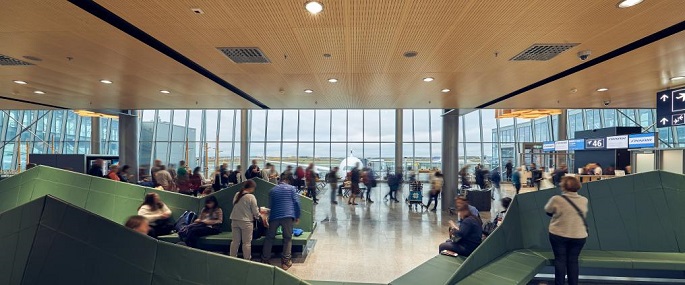Transfer traffic capacity expanded at Helsinki Airport
Published : 26 Dec 2019, 15:01
Updated : 27 Dec 2019, 17:03
The Terminal 2 expansion in Helsinki Airport has increased the airport’s capacity for transfer traffic between Asia and Europe. The new terminal areas are taken into use piece by piece, but as a whole, they create a memorable space for passengers, said Finavia in a press release.
“The expansion project that started in 2015 has proceeded to its final third of the schedule. An important milestone was reached in February 2019 when the new central square Aukio was opened between the south and west piers of the expansion area,” said Project Manager Esa-Pekka Timonen from Finavia.
Aukio is an architecturally impressive space – the heart of the expansion area, surrounded by shops, restaurants and services, bringing a total of 25,000 square metres of new space for passengers.
Next to Aukio, a modern security check area for transfer passengers was also opened in February this year.
In July, an expansion of the border control area was taken into use, bringing more capacity for transfer passengers travelling between Europe and Asia. The area has 50 new automated passport control machines, making passport control the most advanced one in Northern Europe.
Over the year, the new West Pier with passenger gates and jet bridges for wide-body aircraft has expanded alongside Aukio. The first part of the expansion opened in May and the second part was taken into use in November.
“The over 300-meter-long West Pier strongly increases the capacity for non-Schengen flights. The first phase gave us five new bridge gates for wide-body aircraft, and the second part gives us four more,” says Timonen.
In November, an expansion of the baggage handling centre was taken into use below Aukio and the West Pier, increasing the baggage handling capacity at Helsinki Airport by 50%.
All new aircraft stand in South Pier, West Pier and the upcoming area around gates 37-39 are suitable for aircraft de-icing.
“The aircraft parking locations have been built with special coating structures and sewage pipes, and the water used for washing the planes will be carefully collected. This is part of Finavia’s water management that protects local waters from being contaminated with substances that don’t belong in nature,” said Timonen.
The new bridge gates in West Pier are Multiple Aircraft Ramp System (MARS) gates that can accommodate one wide-body aircraft or two narrow-body aircraft at the same time. Two more will be installed later in the northern expansion area.
In the expansion project, Finavia has partnered up with YIT in terminal construction and Destia in apron construction. The project, worth nearly half of the billion-euro development programme of Helsinki Airport, has been executed in several interconnected parts. All of it has not been ordered at once.
“This is a strategic decision for both managing risks and being able to have a faster schedule. If there had been significant changes in our business environment, we could have carried out the project only partially. Planning work has been carried out piece by piece as the project moved forward, which has made execution faster,” said Timonen.
Eventually, the project has been implemented in its original scope and on schedule.
“The business and passenger numbers at Helsinki Airport have developed as expected and even faster, so we haven’t had to leave anything out of the original plan,” Timonen said.
Even though the expansion area is completed piece by piece, the end result will be a cohesive experience for passengers. The entire expansion of the non-Schengen area has been designed by the architects’ office PES-Architects. The abundant use of glass and wood will provide brightness and create a sense of being close to nature.
“Millions of international passengers get their first taste of Finland here. The goal has been to make Helsinki Airport – and Finland – memorable even for those passengers who are only transferring to their next flight,” Timonen said.
The project implementation work will continue next year, as the gates 37-39 are currently in execution phase. This part of the project also includes changes in commercial spaces, a pathway for arriving passengers as well as staff facilities and storage spaces that have already been taken into use. The final part of the project is expected to be completed by summer 2021.


